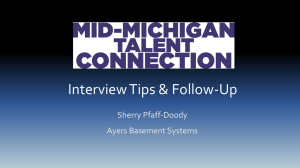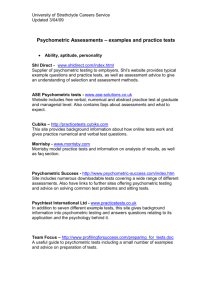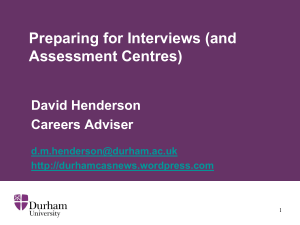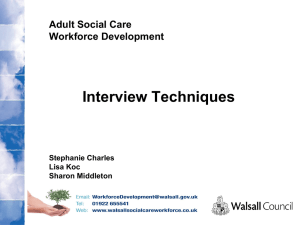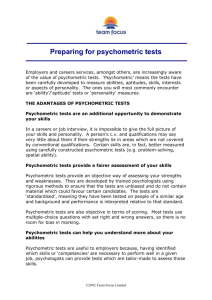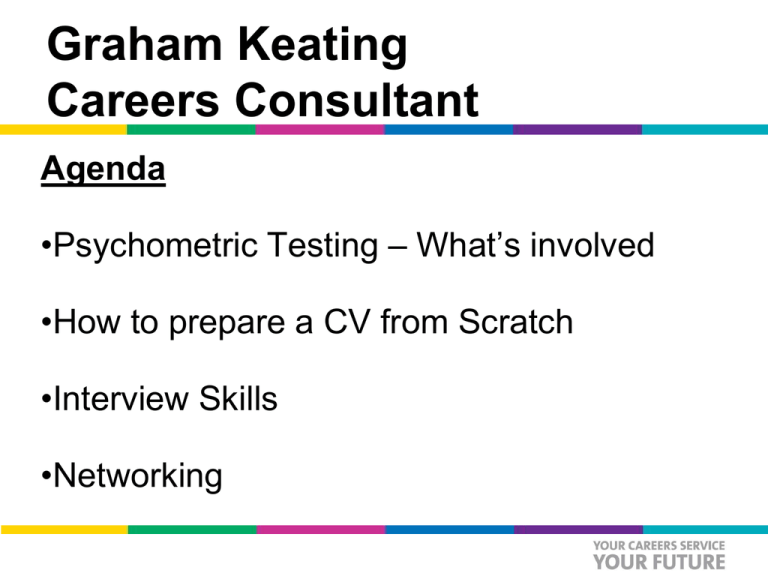
Graham Keating
Careers Consultant
Agenda
•Psychometric Testing – What’s involved
•How to prepare a CV from Scratch
•Interview Skills
•Networking
Graham Keating
Psychometrician
Psychometric Testing
Dictionary:
Psychometrics (n)
‘The branch of psychology that deals
with the design, administration, and
interpretation of quantitative tests for
the measurement of psychological
variables such as intelligence,
aptitude, and personality traits.’
2+2=?
“Numeracy tests are
useless; they test
nothing.”
(Manchester student)
AGR Survey
92% of employers considered
psychometric testing to be a
useful or very useful aid to the
recruitment process.
(Association of Graduate
Recruiters survey)
Psychometric Tests used in
Recruitment
1. Ability or Aptitude Tests
• Verbal
• Numerical
• Logical
2. Personality or Interest
Inventories
Why do employers use tests?
• To identify key abilities or
personalities
• To support other selection tools
Selection Tools
Tests are usually part of the selection process
together with:
• application forms and CVs
• interviews
• group exercises
• presentations
Selection Methods Advantages
• Application Forms...
good for checking facts, demonstrating written
communication skills
• Interviews...
good for oral communication skills, quickness of
thought, personality
• Psychometric Tests...
good for measuring candidates’ abilities/personality
against objective criteria (and other candidates)
Selection Methods –
Disadvantages
• Application Forms....
measures ability to fill in form - not to do the job
• Interviews...
intensely subjective, they might not like the look
of you
• Psychometric Tests
no good for seeing how an individual works with
others
Characteristics of Tests
Ability or Aptitude Tests
• Under exam conditions
• Usually timed
• Right and wrong answers
• Unusual to finish all questions
• Results compared with norm group
Specimen questions
Complete the following sentence with the appropriate pair
of words below
Answer - A, B, C, D or E
(Time allowed 20 seconds)
Early….………..of hearing loss is …….….….by the fact
that the other senses are able to compensate for
moderate amounts of loss, so that people frequently
do not know that their hearing is imperfect.
A.
B.
C.
D.
E.
discovery
development
detection
treatment
incidence
&
&
&
&
&
indicated
prevented
complicated
facilitated
corrected
Answer - C
Next specimen question
Which number, below, is one quarter of the
distance from 5.1 to 5.3 (Time allowed 40 seconds)
A
B
C
D
E
5.125
5.15
5.2
5.25
None of the above
Answer - B
Next specimen question
The driving time for a 100 mile trip from Townsville to Cityville was
two and a half hours. The return trip was made by the same route but
at an average speed that was 50% faster. What was the total amount
of driving time for the entire round trip? (Time allowed 1 minute)
A
B
C
D
E
3hrs 45 minutes
4hrs 10 minutes
4hrs 16 minutes
4hrs 45 minutes
6hrs 15 minutes
Answer B
• 1st trip 100 miles in 2 hours 30 minutes = 40mph
• 2nd trip 50% faster = 60mph
• 100 miles at 60 mph = 1⅔ hours = 1 hour 40 minutes
• 2 hours 30 minutes + 1 hour 40 minutes = 4hours 10 minutes
Next specimen question
In the example given below, you will find a logical sequence of five boxes. Your task
is to decide which of the boxes in the bottom row completes this sequence. To give
your answer, select one of the boxes marked A to E.
(Time allowed 30 seconds)
+
)
[+
)
[
+) [
)
[
)
[+
+
A
B
C
D
E
+
)
[+
(
[
+
)
[
)
[
+
+( [
Answer - D
Next specimen question
In the example given below, you will find a logical sequence of five boxes.
Your task is to decide which of the boxes in the bottom row completes
this sequence.
To give your answer, select one of the boxes marked A to E.
(Time allowed 30 seconds)
A
B
C
D
E
Answer - B
How did you do?
Characteristics of Tests
Personality or Interest Inventories
• Not usually timed
• No right and wrong answers
• Contain internal checks for inconsistent
answers
• Results in the form of a profile should be
shared with candidate
Personality or Interest Inventories
Example question
Mark the statement most (M) like
you and the one least (L) like you
a) I don’t feel that time is wasted on planning
b) I feel uneasy in the company of
unconventional people
c) If I’m annoyed with someone I don’t show it
Personality or Interest Inventories
Example question
Pick the statement that best describes you
from each pair
a) I try very hard
b) I put everything in its place
a) I want to be exciting
b) I want to be successful
a) I like to try new things
b) I’d rather not work on my own
How to prepare
• Practise as much as possible
• Become familiar with test conditions
• Brush up basic maths - percentages, ratios, etc
• Use reference books in the Careers Service
• Use examples and practice tests on SHL & others’ websites
http://www.manchester.ac.uk/careers/
applicationsinterviewsandpsychometrictests/psychometrictests/
• Profiling for Success – On-line tests licensed for Manchester
students; free of charge.
CVs and Covering Letters
The purpose of the
CV is......
......to get an
interview
The Market
• It is very competitive
• An organisation might receive up to
100 applications per vacancy
• Typically, only about 10% to 15% gain
an interview
• You don’t get a second chance
C.V. Facts
or the myth of the perfect C.V.
• C.V.s should be _ pages long
• C.V.s should be in chronological order
• C.V.s should include referees’ names and
addresses
• C.V.s should include - date of birth
nationality
sex
marital status
• C.V.s take days to write and minutes to read
Types of CV
• Standard
• Skills based
• Academic
Task no: 1 - Self Assessment
What have you got to offer ?
• Education
• Work Experience
• Activities and Interests
Task no: 1 - Self Assessment
What have you got to offer ?
• Education
Seminars
Presentations
• Work Experience
Camp America
Waiter, local restaurant
• Activities and Interests
Secretary - Badminton club
Travel
Task no: 1 - Self Assessment
What have you got to offer ?
• Education
Seminars -
presentation skills, working in a
team, influencing others
• Work Experience
Camp America - taking responsibility, patience,
tact, sensitivity, creativity,
leadership
• Activities and Interests
Secretary,
organising, persuading,
Badminton club- motivating, numeracy
Three advanced suggestions
• Use strong words
• Quantify
• Stress personal involvement
Use strong words
• Words like: created, started, managed, designed,
devised...
• NOT ‘My project was a study of local theatres’
• BUT ‘ I organised an extensive survey of student
use of local theatres. I arranged interviews with
students, analysed the results and presented the
information to my tutor
And ……Quantify
‘ I organised an extensive survey of
student use of local theatres, involving
over 1000 questionnaires.
I arranged interviews with 80 students,
analysed the results using Microsoft
Excel and presented the information
to my tutor’
Stress personal involvement
and results
• NOT ‘We organised a charity fund raising
event’
• BUT ‘I was responsible for the publicity for a
fund raising event which involved negotiating
advertising with local companies and
arranging posters on campus. We managed
to raise £1000 for charity and over 800
students attended’.
Task no: 2 - What does the
employer want ?
• Employers recruit against specific criteria
• These are usually set out in brochures or
on their websites
• All require appropriate personal qualities
• It is not enough to claim certain skills,
you must provide the evidence
Key Skills Requested By Graduate
Recruiters
•
Business focus, Drive and resilience, Task management, Career motivation,
Leadership, Building relationships, Problem Solving, Making an Impact
•
Communication, Teamwork and collaboration, Adaptability, Creative problem solving,
Drive to achieve, Customer focus, Trustworthiness, Taking ownership, Passion for
Business
•
Customer focus, Achieving, Influencing, Thinking, Collaboration & Teamwork, Team
Leadership, Self Management, Confidence, Commercial Awareness
•
Problem solving, Achieving results, Communicating and influencing, Leadership, Drive
and motivation, Building relationships
•
Analytical Ability, Problem-solving skills, Communication skills, Interpersonal skills,
Generic business awareness
• KPMG - The Co-operative - HSBC
Cancer Research UK - IBM
-
Key Skills Requested By Graduate
.
Recruiters
IBM
Communication, Teamwork and collaboration. Adaptability, Creative problem solving,
Drive to achieve, Customer focus, Trustworthiness, Taking ownership, Passion for Business
The Co-operative
Customer focus, Achieving, Influencing, Thinking, Collaboration & Teamwork
Team Leadership, Self Management, Confidence, Commercial Awareness
KPMG
Business focus, Drive and resilience, Task management, Career motivation, Leadership,
Building relationships, Problem Solving, Making an Impact
Cancer Research UK
Problem solving, Achieving results
Leadership. Drive and motivation, Communicating & influencing, Building relationships
HSBC
Analytical ability, problem-solving skills, communication and interpersonal skills and some
generic business awareness.
Core skills employers look for
•
•
•
•
•
•
•
Communication skills
Organising ability
Problem-solving
Working in a team
Drive and initiative
Taking responsibility
Working under pressure
Core skills employers look for
•
•
•
•
•
•
Analytical skills
Creativity
Leadership
Motivating others
Planning
Numeracy
When to use a C.V.
• When you are asked to !
• When they say ‘apply in writing’
• For speculative applications
• When networking
Covering letters
• This is your trailer to the main feature
• One page, A4, quality paper
• Should include two major themes:
- Why you want the job (and
organisation)
- Why you are suitable
Covering letters
• Write to a named individual, if possible
• Tell employer what you are applying for
(and where you saw it advertised)
• Be positive
• Emphasise your USPs, don’t simply copy
CV
• End letter with spirit of expectation
CV’s
SPELL CHECKER – A WARNING
I like my new spell checker.
It came with my PC.
It plainly marques four my revue,
Mistakes I can not sea.
I’ve run these verses threw it,
I’m sure your please two no.
It’s letter perfect in its weigh,
My checker tolled me sew.
Previous applications…
“I enjoy practicing marital arts”
“At secondary school I was a prefix”
“In my spare time I enjoy hiding my horse”
“I loathe filling in applications so much that I’ll give you details at the
interview”
“Special skills: Thyping”
“Thank you for your consideration. Hope to hear from you shorty”
“I have worked in the pubic sector……”
“Hi I want 2 get a job with U”
Previous applications…
“I am someone who knows my own destiny, but I have no definite long term plans”
“I am a conscious individual”
“I have excellent memory skills, good analytical skills, excellent memory skills”
Reason for leaving last job.
“They insisted that all employees get to work by 8.45 every morning. I
could not work under those conditions.”
Problems faced:
“I had no support so I compiled a letter to the client using trial and
error.”
Influencing people:
“Recently my flatmates came to ask about whether the heating should
be on and for how long.”
Previous applications…
“Being a Virgoan, my sense of
assertiveness and resilience has
prompted me to continue with my
ambition to be a solicitor in a
major city law firm.
I am also a seventh generation
descendant of a Chinese
princess and a Sulawesian
warrior, which makes me both an
amiable and energetic person”
INTERVIEWS
50
YOU SHOULD KNOW…
• 50% of those
interviewed are rejected
at the first round, so …
First impressions
count!
51
INTERVIEW CONCERNS
•
•
•
•
•
•
How should I dress
Arrival / greeting
Taking items into the interview
How should I sit
To gesture or not to gesture
Difficult questions - (later)
52
YOU NEVER GET A SECOND CHANCE
TO MAKE A FIRST IMPRESSION
“I travelled down to London for an important interview.
The train was a little late so I just had enough time to
get to the building and rush in.
The interview seemed to go well and I felt confident
until I visited the washroom on the way out.
I had been reading the newspaper on the train and in
my nervous sweaty state the newsprint must have
rubbed off onto my hands
It was now all over my face!”
Chemistry Graduate
53
YOU NEVER GET A SECOND CHANCE TO
MAKE A FIRST IMPRESSION - (CONTINUED)
“One of my colleagues once found her
interviewee asleep in the foyer. Getting
enough sleep may be an important part of
interview preparation, but this was taking it
too far!
On top of that the candidate demonstrated a
sleepy laid back attitude throughout the
interview, which didn’t go down very well
either.”
Geraldine Lyons - Mars
54
WHAT AN INTERVIEW IS ..
• A conversation
with a purpose
• Adult
• Two way
• Science no,
emotional yes
55
WHAT AN INTERVIEW ISN’T
• A scheme to
humiliate you
• An interrogation
• Perfect
56
DIFFERENT TYPES OF
INTERVIEW
•
•
•
•
One to one
Panel
Sequential
Telephone
• Conventional
chronological
• Behavioural
• Situational
• Combination of all of
the above
57
STRUCTURED INTERVIEWS
• Behavioural: Describe a time when
you’ve ‘gone the extra mile’ in your
dealings with another person
• Situational: You have just arrived at a
clients office, only to discover you have
left all of your notes back at the office
what would you do?
DIFFICULT QUESTIONS
• Before the interview consider the
following:• Personality
• The job
• The company/ competition
• Your achievements and skills / work
experience
• Your strengths
• Your weaknesses
• Your questions
WHAT EMPLOYERS WANT
•
Know what the employer wants
•
Usually easy to identify
–
Brochures, ads, presentations, company
website.
–
Do your homework – many applicants
don’t… Emphasis on Attitude as well as
Aptitude
–
Being clever is not enough
–
Employers look for characteristics which
define you as somebody they want
THE PATH TO SUCCESS
Know yourself
What can you offer an employer?
Give a rounded view: Education / Work Experience/Activities
& Interests
Assess critical incidents and identify what you have
learned, the skills you developed
Focus on knowledge, skills, abilities and RESULTS
Have specific examples in mind: EVIDENCE
WORK EXPERIENCE
“One candidate, when asked what she
found challenging about her previous
work experience, said that working in
a fast food restaurant had taught her
to ‘work with stupid people with
stupid problems.’
I did not really feel she had the
patience to deal with the average lay
client
Sally Marsden
Pannone & Partners - Solicitors
THE COMPETITION
“ I was being interviewed for a job on the
Daily Express.
I rashly claimed that the paper was
‘unlike the Sun, because only morons
work for the Sun.’
At which point one interviewer turned to
the other and said; ‘it’s been almost a
year since we worked there hasn’t it?’”
English Graduate
WHAT’S THE QUESTION?
• Interviewer: “Who would
you most like to have dinner
with; either living or dead.”
• Applicant: “ Preferably
someone living.”
SUMMARY
• Prepare for success
• Practice with a friend
• Don’t underestimate the importance of first
impressions
• Don’t panic
• They would like to give you the job
• Leave a good impression
• Be positive, enthusiastic, natural,
honest, happy
The Networking Game…..
Finding out about
jobs & careers
Who is in the know ? –
a look at the job market
Adverts
6%
8%
22%
64%
Agencies / Headhunters
Contacts
Internal moves
& promotions
Creative Job Research
What is Networking?
• A way of asking for help
– Information & advice
• A key way to find jobs or leads for jobs
• People do it all the time
– Getting a decent plumber / builder
– Getting help with an IT problem
Networking
Most people want to help...
• Most people like to be asked for their
advice.. a sign of recognition
• One good turn deserves another...you may
be in a position to help them – your views /
comments etc
Creative Information Hunting
Networking leads to success....
• Its all about being proactive …Contact
organisations you are interested in and
arrange to speak to them or meet with
employers who visit campus and pick their
brains
• Try it. It works.
• It takes time to succeed.....but once set up this
skill can be developed and serve you well for
years
Networking:
Good things to ask
• How did you get into this occupation?
• What attracted you to this occupation?
• What is the progression of jobs from entry level to more
senior positions?
• What is a typical day like for you?
• What skills, abilities and attitude do you need to be
successful in this occupation?
• What changes do you see in this field in the next few
years?
• How does your organisation tend to recruit?
• Do they ever take people for voluntary projects?
Everyone has Contacts
•
•
•
•
•
But I don’t know anyone ...
Friends / relatives / neighbours
Other students
Tutors
Work colleagues
Employers - recruitment events,
presentations, insight courses, mentoring
programmes, careers consultants!
What the Careers Service offers
•
•
•
•
•
•
•
•
•
•
•
•
Guidance appointments
Advice on CVs & applications
Talks
Insight courses
Careers Fairs
Mock Interviews
Practice psychometric tests
Mentoring
Blogs
facebook
Resource centre
Graduate directories and take away information
• Vacancy service and lots more………..
Careers Resource Centre
Crawford House –
Entrance
on Booth Street East
(opposite the Aquatics Centre)
Appointments
Phone : 0161 275 2829
www.manchester.ac.uk/careers
THANKS FOR LISTENING!
GOOD LUCK FOR THE FUTURE!






